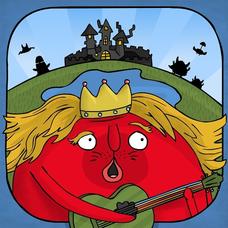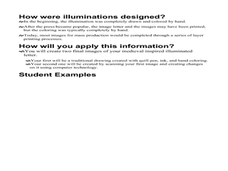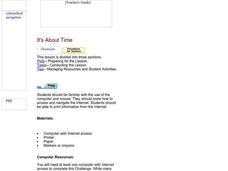Florida Center for Reading Research
Phoneme Split and Say
Little ones are provided with all the tools needed to begin segmenting phonemes. There are twenty Elkonin box picture cards, five blank Elkonin box cards, and full instructions on how to help pre-readers practice splitting and saying...
Common Sense Media
Which Me Should I Be?
Impress upon learners the importance of considering how we identify ourselves online, and how this relates to overall considerations of safety and digital wellness.
Curated OER
Acrobatic Clown
In this science investigation instructional activity, students learn about balancing points and center of gravity by making a cardboard acrobatic clown using the directions and pattern provided.
Curated OER
Welcome to the Americas
Young scholars research and map the North and South American continents. For this geography lesson on the Americas, students can locate North, Central and South American countries and states. Young scholars choose a location to research...
Florida Center for Reading Research
Phonological Awareness: Phoneme Isolating, Final Phoneme Find
This phonics activity engages listening skills and concentration. Young scholars listen to a teacher-made recording and use the provided worksheet to number the final phonemes they hear.
Curated OER
Macbeth News Broadcast
Here is an authentic assessment task for Shakespeare's Macbeth. Young literature scholars prepare, perform, and record a news broadcast about the major events in the play. For example, groups may choose to report on the death of Lady...
Florida Center for Reading Research
Phonics: Letter-Sound Correspondence, Words Around Us Memory Game
Scholars employ memory and letter-sound skills like the classic game Concentration to succeed at this literacy game. Partners choose from rows of upside-down cards, trying to match letters to images with the corresponding initial sound.
Florida Center for Reading Research
Phonics: Encoding and Decoding, Vowel Stars
Learners are given a star; each star contains a c_c form in the center and vowels on each point. They use the vowels to fill in the blank between the consonants making a simple CVC word. They write each word they make on a piece of...
Florida Center for Reading Research
Phonics: High-Frequency Words, Word Fishing
To practice reading high-frequency words fluently, learners play a fishing game at a learning center. They take turns fishing; each fish contains a single high-frequency word. To keep the fish they caught, they must be able to read the...
National Institute of Open Schooling
Solid State
Crystal comes from a Greek word meaning ice. Activity eight in a series of 36 has class members analyzing amorphous and crystalline solids and further classifying them based on their forces. They then explore solids, learning about unit...
iMagine Machine
The Land of Venn - Geometric Defense
Young mathematicians use their geometry skills to save the Land of Venn in an engaging math game. A fun way to reinforce children's understanding of basic geometric figures and shapes.
Curated OER
Designing Illuminated Text
Students examine illuminated manuscripts from the Gutenberg Bible. Using the examples, they use the internet to explore the effects of the printing press on the value of literature and art. They create their own illuminated initial...
Curated OER
Exploring American Tall Tales
Students explore elements of American folktales and tall tales. For this literature lesson, students read examples of American folktales and tall tales and prepare a monologue or news report to present to the class based on their readings.
Curated OER
It's About Time: Olympics, Winter Sports, Math, Media, Time Zones
Students use the Internet to determine broadcast times for the Winter Olympic Games snowboarding competitions. In determining these times, they need to consider time zones throughout the world.
Curated OER
Recognizing Reference Sources
Fourth graders investigate five different reference sources in the Media Center: Atlas, Dictionary, Encyclopedia, Card Catalog (Look Up Station), and the Internet. They decide which is the BEST source to use to answer specific questions.
Curated OER
Self-Esteem, Advocacy, Media Literacy
Young scholars recognize their strengths and personality traits. As a class, they discuss and brainstorm qualities a professional organization may look for in a company representative. They observe a commercial and determine the intended...
Curated OER
Language Arts: Paraphrasing Research Material
Students visit the school media center to research their favorite historical figures. Following a discussion of paraphrasing, they find information in library materials about their figure. Once students compile their information, they...
Curated OER
Magazine Sales Talks
Students role-play to determine the best types of magazines that should be purchased for their media center. They create a sales presentation for a particular magazine in small groups. As they listen to each presentation they evaluate...
Curated OER
Why We Communicate
Young scholars identify the three common reasons for communication: information, persuasion, and entertainment. They create media messages for different purposes and develop a purpose of message shapes and how it helps shape the message.
Curated OER
Creating a How To Book
Third graders investigate "How To" books by watching a "How To" video and looking at books in the media center. They make a class "How To" book with a title page, table of contents, individual student pages, and graphics which they make...
Curated OER
Decoding Information From the Catalog
Fifth graders identify the parts of a print catalog record as a way to find information and the location of a book in the media center. They complete a worksheet about decoding a catalog record, complete a Mad Libs activity online, and...
Curated OER
Owen
Students discuss items they may have wanted to bring to school, but were not allowed to. (Example: Blanket). Their responses are listed on chart paper. They listen to the teacher read "Owen" by Kevin Henkes. Students discuss appropriate...
Curated OER
Everybody Needs a Rock
Second graders examine science non-fiction books in the 500 section of the media center. They listen to Byrd Baylor's, Everybody Needs a Rock, and write a sentence that tells why everyone does need a rock. They illustrate the sentence.
Curated OER
Understanding Persuasive Writing
Learners give examples of how the media glamorize violence and desensitize viewers to the horrors of real acts of violence. They identify factors in addition to the media that contribute to the problem of violence in society.
Other popular searches
- Media Center Map Skills
- Library Media Center
- School Library Media Center
- Media Center Orientation
- Media Center Games
- Media Center Lesson Plans
- Media Center Lessons
- Alphabet Media Center
- Media Center Vocabulary
- Media Center Rules
- Atlas Media Center
- Using Media Center























